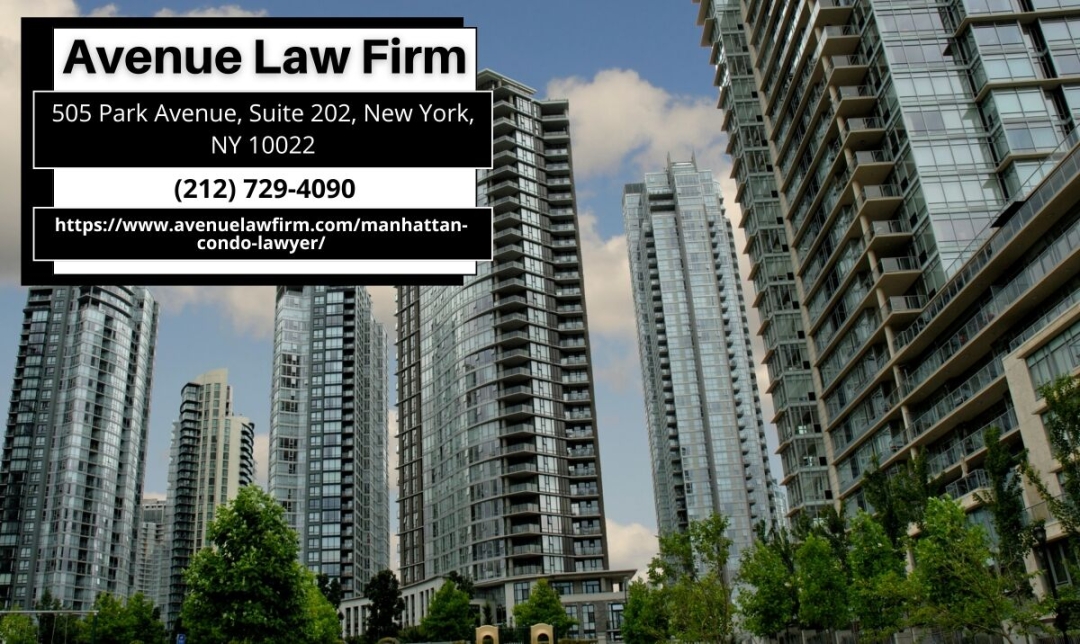Manhattan condo lawyer Peter Zinkovetsky of Avenue Law Firm has published an article that provides an overview of condominium ownership in New York City. The article outlines the legal and financial aspects of buying and owning a condo, offering guidance to prospective buyers, current owners, and investors.
In New York, condominiums are a popular choice for buyers seeking homeownership with more control than a co-op offers. The Manhattan condo lawyer explains that when purchasing a condo, the buyer gains ownership of a specific unit and an undivided interest in the building’s common areas. This legal structure grants greater autonomy and flexibility compared to co-ops, which require board approval and involve purchasing shares in a corporation.
“With a condo, the owner holds real property, not shares,” the Manhattan condo lawyer states. “That distinction comes with important legal rights and fewer restrictions on use and transfer.”
The article highlights the due diligence process involved in buying a condo in Manhattan. It includes reviewing the building’s offering plan, bylaws, financial statements, and the minutes of board meetings. Peter Zinkovetsky emphasizes the importance of assessing a building’s financial health and understanding its rules regarding leasing, renovations, and amenities. “A strong building with well-managed reserves and clear policies can help protect the investment and provide peace of mind,” he says.
Buyers must also be prepared for closing costs, which in condominium transactions may include title insurance, mansion tax (for properties above a certain value), and mortgage recording tax—unlike co-op purchases, which do not incur this tax. Zinkovetsky explains that being aware of these expenses helps buyers budget effectively and avoid surprises at closing.
For investors, condominiums offer more favorable conditions than co-ops when it comes to subletting. While co-ops often place heavy restrictions on renting out units, condos typically allow it with minimal limitations, making them more suitable for rental income or pied-à-terre ownership. “Condos give owners more flexibility to manage their property as they see fit, which is especially attractive in Manhattan’s dynamic real estate market,” says Zinkovetsky.
Peter Zinkovetsky also outlines the responsibilities that come with condo ownership. Owners are required to pay monthly common charges to cover building maintenance and shared services. These fees are separate from property taxes, which condo owners must pay directly. “Understanding these financial obligations is essential before committing to a purchase,” he notes.
The article further explains that condo boards have less control over sales and transfers than co-op boards, but they still play a role in managing the building. The board enforces building rules, oversees repairs and improvements, and maintains compliance with local regulations. While the approval process for buyers is generally simpler, boards can still exercise a right of first refusal in rare cases.
Legal support during a condo transaction is critical. Peter Zinkovetsky points out that real estate contracts in New York are binding once signed, and buyers need a knowledgeable attorney to review the terms, negotiate favorable conditions, and ensure compliance with city and state laws. “An experienced condo lawyer helps safeguard the investment and streamlines the process from contract to closing,” he states.
The article also addresses disputes that can arise during or after a condo purchase, such as conflicts with the board, issues with construction defects, or disagreements with neighboring unit owners. Zinkovetsky advises that early legal intervention can often resolve these matters before they escalate. “A clear understanding of the rights and obligations involved can prevent costly and time-consuming disputes,” he explains.
Whether buying a first home, investing in rental property, or addressing an existing condo ownership issue, understanding the legal landscape is essential. Peter Zinkovetsky’s article provides practical knowledge for anyone dealing with Manhattan condominiums, helping them make informed decisions in a complex market.
About Avenue Law Firm:
Avenue Law Firm is a Manhattan-based real estate law firm led by Peter Zinkovetsky. The firm offers legal services for residential and commercial transactions, with a focus on condominium and co-op purchases and sales. Known for its attention to detail and client-centered approach, Avenue Law Firm helps buyers, sellers, and investors handle New York’s real estate market with clarity and confidence.
Embeds:
Youtube Video: https://www.youtube.com/watch?v=trMuUzkgiCE
GMB: https://www.google.com/maps?cid=14223199020890935024
Email and website
Email: peter@avenuelawfirm.com
Website: https://avenuelawfirm.com/
Media Contact
Company Name: Avenue Law Firm
Contact Person: Peter Zinkovetsky
Email: Send Email
Phone: (212) 729-4090
Address:505 Park Ave Suite 202
City: New York
State: New York 10022
Country: United States
Website: https://avenuelawfirm.com/


